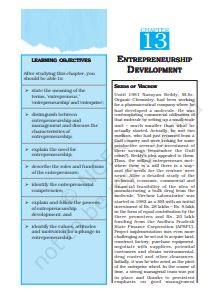‘Entrepreneurship Development NCERT Solutions for Class 12 Business Studies Chapter 13‘ PDF Quick download link is given at the bottom of this article. You can see the PDF demo, size of the PDF, page numbers, and direct download Free PDF of ‘Ncert Class 12 Business Studies Chapter 13 Exercise Solution’ using the download button.
Entrepreneurship Development NCERT Textbook With Solutions PDF Free Download

Chapter 13: Entrepreneurship Development
Entrepreneurship is the process of setting up one’s own business as distinct from pursuing any other economic activity, be it employment or practicing some profession.
The person who set up his business is called an entrepreneur. The output of the process, that is, the business unit is called an enterprise.
You may invoke the ‘subject-verb-object (SVO)’ relationship in English grammar to clearly understand these terms.
It is interesting to note that entrepreneurship besides providing self-employment to the entrepreneur is responsible to a great extent for the creation and expansion of opportunities for the other two economic activities, that is, employment and profession.
(Can you think why and how?) Further, each business gives rise to other businesses– the suppliers of raw materials and components, service providers (be it transport, courier, telecom, distributor middlemen and advertising firms, accounting firms and advocates, etc.
And, in the process, entrepreneurship becomes crucial for the overall economic development of a nation.
Given its important role in the overall scheme of economic development, it is interesting to note that not many persons opt for a career in entrepreneurship.
Traditionally, it was believed that entrepreneurs are born. No society can wait for the chance
of ‘birth’ of entrepreneurs to pursue its developmental plans.
In fact, plans for economic development would bear little fruit unless entrepreneurship development is regarded as a deliberate process of making people aware of entrepreneurship as a career at an early age and creating situations where they may actually make a choice to become entrepreneurs.
When you make this choice, you become a job provider rather than a job-seeker, besides enjoying a host of other financial and psychological rewards.
Taking to entrepreneurship is surely more a matter of aspiring to become an entrepreneur rather than being born as one.
| Author | NCERT |
| Language | English |
| No. of Pages | 35 |
| PDF Size | 388 KB |
| Category | Business Studies |
| Source/Credits | ncert.nic.in |
NCERT Solutions Class 12 Business Studies Chapter 13 Entrepreneurship Development
1. Clarify the meaning of the terms ‘entrepreneur’, ‘entrepreneurship’, and ‘enterprise’.
Ans: The three terms ‘entrepreneur’, ‘entrepreneurship’, and ‘enterprise’ are different yet interrelated to each other.
An entrepreneur refers to a person/individual who starts up a business. He is the one who takes up the basic idea of setting up the business.
In the process of setting up the business, he undertakes risk, coordinates production resources, and undertakes innovation.
This whole process of setting up a new business is called entrepreneurship. The final result, that is, the business which is established after undertaking the process of entrepreneurship is called an enterprise.
Thus, an ‘entrepreneur is the person who undertakes the ‘process of entrepreneurship’ to set up an ‘enterprise’.
2. Why is entrepreneurship regarded as a creative activity?
Ans: Entrepreneurship is the process of setting up one’s own business by an individual. Entrepreneurship is regarded as a highly creative activity as it is said that entrepreneurship adds or creates ‘value’.
An entrepreneur creates a link between the raw materials and the products produced as per the needs of society. Such a process adds to the income and wealth.
Even if new creation destroys the existing industries, for instance, new laptops are replacing the old desktop computers, it is termed creative destruction.
Entrepreneurship is also regarded as creative in the sense that it involves the introduction of new products and technology.
Even if new products or technology are not discovered but rather adopted from existing ones, they are no less than innovation. This is because to use old techniques in a new way requires creativity.
For instance, the creator of laptops used the old technique of tablet computers in a new way and thereby created laptops. Thus, creativity can be called as the essence of entrepreneurship.
3. ”Entrepreneurs undertake moderate risks”. Elaborate on this statement.
Ans: In the writings of Richard Cantillon, an entrepreneur is described as an agent who purchases means of production at certain prices, and converts them into final products to sell them at uncertain prices in the future.
Herein, the key element which needs to be taken into consideration is ‘uncertainty regarding the future. When an entrepreneur starts up a new business he is never sure of its success.
It may happen that the business may flourish in a successful direction or it might also happen that it ruins everything that the entrepreneur has.
Although the possibility of absolute ruin is very rare, the risk is always there. Moreover, when an individual opts for entrepreneurship as a career he gives up a career in employment.
That is, he gives up a well-promised job or profession that provides assured returns. However, in reality, what he is taking up is called moderate and calculated risk.
When an entrepreneur decides to take up a new business venture, then first of all he weighs the favors against the odds on the basis of his skills, abilities, and confidence. On this basis, they generally avoid situations that are highly risky.
Thus, they do undertake risks but such risks are moderate and calculated ones.
They take up those ventures where the odds and favors are in equal probability and where they have the confidence of converting only a 50% probability of success into 100% success. Thus, it can be said that they undertake moderate and calculated risks.
NCERT Class 12 Business Studies Textbook Chapter 13 With Answer PDF Free Download
